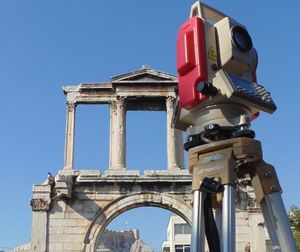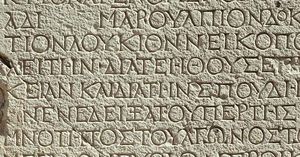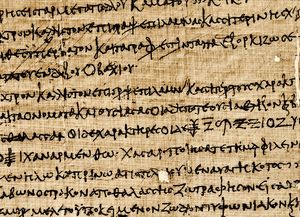- Αρχική
- NEWS AND EVENTS
- THE PROGRAM
- ADMISSIONS
- APPLICATION
- RESOURCES
-
ACADEMIC STAFF
- GEORGIOS ARABATZIS
- DIMITRA ANDRIANOU
- SOPHIA ANEZIRI
- ATHENA BAZOU
- AIKATERINI - NINA CARVOUNIS
- NIKOLAS DIMAKIS
- ELENI FASSA
- MYRTO GARANI
- NIKOS GIANNAKOPOULOS
- NIKOLAOS HAROKOPOS
- ROSALIA HATZILAMBROU
- NIKOLETTA KANAVOU
- CHRYSANTHOS KANELLOPOULOS
- ELENI KARAMALENGOU
- GRAMMATIKI KARLA
- STYLIANOS KATAKIS
- EURYDICE KEFALIDOU
- KONSTANTINOS KOPANIAS
- AIKATERINI KOROLI
- EVGENIA D. MAKRYGIANNI
- STEPHANOS MATTHAIOS
- ANDREAS MICHALOPOULOS
- MICHEL ROGGENBUCKE
- ANDREAS MORAKIS
- YIANNIS PAPADATOS
- SOPHIA PAPAIOANNOU
- AMPHILOCHIOS PAPATHOMAS
- PETRAKIS VASSILIS
- VAIOS VAIOPOULOS
- DIMITRIS PLANTZOS
- ELENI PSOMA
- MARIANNA THOMA
- GIORGOS VAVOURANAKIS
- IOANNIS VOSKOS
- TIMETABLE
- CONTACT
-
GALLERY
- VIDEOS
- PNYX, JULY 2021
- NATIONAL ARCHAEOLOGICAL MUSEUM, JULY 2021
- LYCEUM OF ARISTOTLE, NOVEMBER 2021
- THEATRE OF DIONYSUS, NOVEMBER 2021
- CRETE, NOVEMBER 2021
- ARCHAEOLOGY AND HISTORY OF ART MUSEUM AND CONSERVATION LABORATORY, SCHOOL OF PHILOSOPHY, DECEMBER 2021
- KERAMEIKOS, DECEMBER 2021
- EPIGRAPHIC MUSEUM, JANUARY 2022
- BRAURON, JANUARY 2022
- MYCENAE AND TIRYNS, APRIL 2022
- ANCIENT AGORA OF ATHENS, MAY 2022
- OLYMPIA AND DELPHI, MAY 2022
- NATIONAL ARCHAEOLOGICAL MUSEUM, JUNE 2022
- ACROPOLIS, JUNE 2022
- PARTICIPATION IN ARCHAEOLOGICAL SURVEY: IERAPETRA, CRETE, JULY-AUGUST 2022
- ANCIENT AGORA OF ATHENS, NOVEMBER 2022
- CRETE, NOVEMBER 2022
THE PROGRAM
The BA Program in the Archaeology, History and Literature of Ancient Greece brings together three collaborating disciplines from the field of Classics; the Program’s multi-disciplinary curriculum, taught by a diverse staff consisting of highly specialized academics and senior researchers, combines the strengths of the three disciplines in a single, innovative Degree:
Archaeology

The Program includes a systematic survey of prehistoric and ancient Greek archaeology and art. Τhe first six semesters feature course topics such as Minoan and Mycenaean Prehistory, the social significance of ancient Greek art and iconography, the development of ancient Greek architecture and city planning and the relations of the Greek world to the civilizations of the eastern Mediterranean, such as the Hittites, the Egyptians and the Persians. The seventh and eighth semesters feature two seminars that afford in-depth study of specific archaeological topics. The Program places great emphasis upon on-site classes in museums and archaeological sites in Greece, as well as upon hands-on instruction in the University Museum of Archaeology and History of Art and the University archaeological excavation at Marathon.
History

Roughly one third of the Program overall consists of History classes: beginning with an Introduction to Historical Studies in the first semester, students are guided through Greek history with a series of courses on the Greek polis, Alexander the Great and Hellenistic Greece, Greece and Rome, history of religion and sports, as well as a more specialized course in the study of inscriptions and a seminar on the artistic and historical significance of Greek coins.
Ancient Greek and Latin Literature

The Program encompasses a wide range of courses on ancient Greek and Latin literature, across their main periods of development and their most important genres. Students also receive intensive instruction in the Classical Greek and Latin languages. Students get to know major authors and genres of Greek and Latin literature, including Homer and epic, drama, historiography (Herodotus, Thucydides, Xenophon), philosophy and oratory, poetry, as well as the world of ancient papyri. Courses in religion and myth broaden their understanding of the Greek culture and its continuity into the Roman era. The study of literary masterpieces of the Roman world, with a focus on the interactions between Greek and Roman literature, enables students to understand the importance of the Ancient world for the Western tradition and our own, contemporary world.
